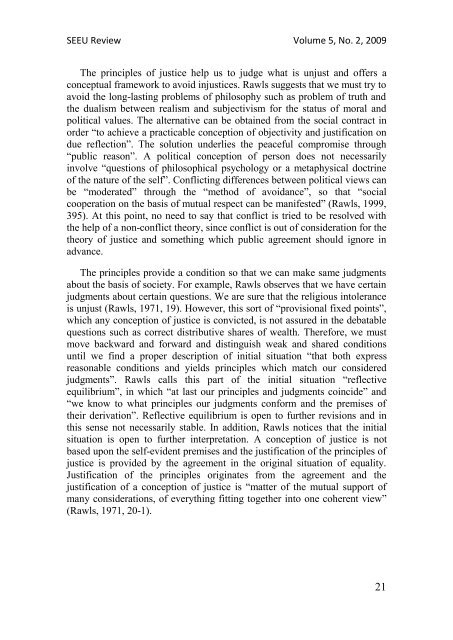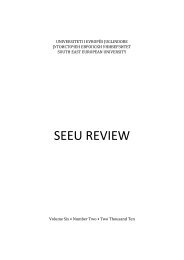SEEU Review vol. 5 Nr. 2 (pdf) - South East European University
SEEU Review vol. 5 Nr. 2 (pdf) - South East European University
SEEU Review vol. 5 Nr. 2 (pdf) - South East European University
You also want an ePaper? Increase the reach of your titles
YUMPU automatically turns print PDFs into web optimized ePapers that Google loves.
<strong>SEEU</strong> <strong>Review</strong> Volume 5, No. 2, 2009<br />
The principles of justice help us to judge what is unjust and offers a<br />
conceptual framework to avoid injustices. Rawls suggests that we must try to<br />
avoid the long-lasting problems of philosophy such as problem of truth and<br />
the dualism between realism and subjectivism for the status of moral and<br />
political values. The alternative can be obtained from the social contract in<br />
order “to achieve a practicable conception of objectivity and justification on<br />
due reflection”. The solution underlies the peaceful compromise through<br />
“public reason”. A political conception of person does not necessarily<br />
in<strong>vol</strong>ve “questions of philosophical psychology or a metaphysical doctrine<br />
of the nature of the self”. Conflicting differences between political views can<br />
be “moderated” through the “method of avoidance”, so that “social<br />
cooperation on the basis of mutual respect can be manifested” (Rawls, 1999,<br />
395). At this point, no need to say that conflict is tried to be resolved with<br />
the help of a non-conflict theory, since conflict is out of consideration for the<br />
theory of justice and something which public agreement should ignore in<br />
advance.<br />
The principles provide a condition so that we can make same judgments<br />
about the basis of society. For example, Rawls observes that we have certain<br />
judgments about certain questions. We are sure that the religious intolerance<br />
is unjust (Rawls, 1971, 19). However, this sort of “provisional fixed points”,<br />
which any conception of justice is convicted, is not assured in the debatable<br />
questions such as correct distributive shares of wealth. Therefore, we must<br />
move backward and forward and distinguish weak and shared conditions<br />
until we find a proper description of initial situation “that both express<br />
reasonable conditions and yields principles which match our considered<br />
judgments”. Rawls calls this part of the initial situation “reflective<br />
equilibrium”, in which “at last our principles and judgments coincide” and<br />
“we know to what principles our judgments conform and the premises of<br />
their derivation”. Reflective equilibrium is open to further revisions and in<br />
this sense not necessarily stable. In addition, Rawls notices that the initial<br />
situation is open to further interpretation. A conception of justice is not<br />
based upon the self-evident premises and the justification of the principles of<br />
justice is provided by the agreement in the original situation of equality.<br />
Justification of the principles originates from the agreement and the<br />
justification of a conception of justice is “matter of the mutual support of<br />
many considerations, of everything fitting together into one coherent view”<br />
(Rawls, 1971, 20-1).<br />
21

















